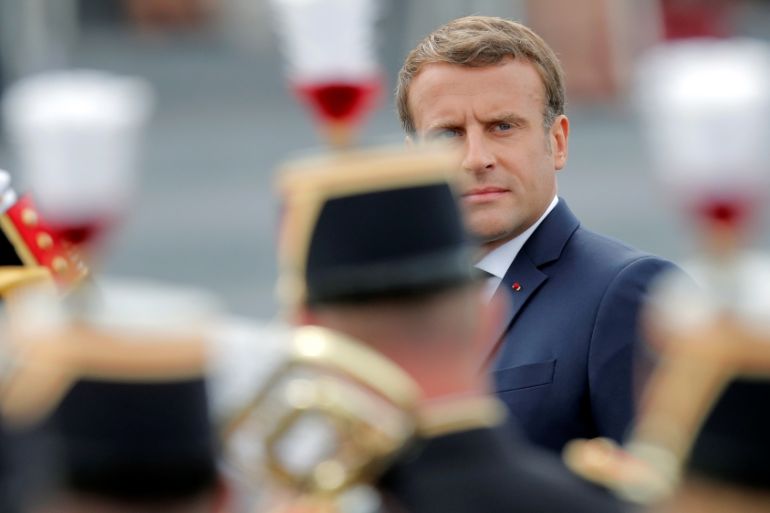France’s Macron rules out immediate troop drawdown from Sahel
French president says rushed exit from volatile region in West Africa would be a mistake, as Chad deploys reinforcements.

President Emmanuel Macron has ruled out an immediate drawdown in France’s 5,100-strong Barkhane forces battling armed groups in the Sahel region of West Africa, describing a rushed exit as a mistake.
Macron said he was pushing back a decision on a troop reduction after a virtual summit of the so-called G5 Sahel countries – Burkina Faso, Chad, Mali, Mauritania, Niger – and their allies to discuss the future of their military campaign in the region.
Keep reading
list of 3 itemsAhead of Sahel summit, where do France and G5 countries stand?
UN says two million internally displaced by Sahel violence
“Changes that are likely to be significant will be made to our military deployment in the Sahel when the time comes, but they will not be made immediately,” Macron told reporters in Paris.
“They will result first of all from a collective discussion with our Sahel partners and with the partners who have accepted to help us, and they will be based on the results obtained and the degree of engagement from our partners,” he said.
Armed groups affiliated to al-Qaeda and ISIL (ISIS), once confined to lawless areas of northern Mali, have in recent years spread across the arid scrublands of the Sahel, into Burkina Faso and Niger, stoking ethnic tensions while jockeying for power and attacking security forces, which have also faced accusations of grave abuses.
The conflict in the western portion of the Sahel largely between state forces and armed groups linked to ISIL (ISIS) and al-Qaeda has ravaged the semi-arid strip south of the Sahara Desert for much of the past 10 years, killing thousands of people and forcing millions from their homes.
The deteriorating security situation has created an enormous humanitarian crisis, destroying fragile agricultural economies and hobbling aid efforts.
France, the region’s former colonial power, is searching for an exit strategy eight years after it sent troops to intervene in Mali against rebel groups who had occupied the north of the country.
It has dispersed the rebels from northern Mali but its operation in the Sahel has cost billions of dollars and 55 French soldiers have been killed, sparking domestic calls for a strategy review,
Last year, Paris boosted its Operation Barkhane numbers by 600 to 5,100 soldiers, stationed in the Sahel alongside United Nations, American and European partners.
“In the coming months, we will not change our presence. We will launch other important operations, and we will above all be reinforced by the Chadian battalion, by the Malian mobilisation, and by contributions from Mauritania,” Macron said.
During the summit, Chad announced plans to deploy 1,200 troops to the “tri-border” region, the three-country point joining Burkina Faso, Mali and Niger which has seen the most intense fighting.
Macron further said an “adjustment” in the French presence would depend on the involvement of other countries in the Takuba Task Force fighting rebels in the Sahel alongside the Malian and Nigerien armies.
Takuba represents part of France’s attempt to share some of the military burdens with its European partners. It will see up to 150 special forces from EU countries deployed to the region, with the Czech Republic, Estonia and Sweden having already sent troops.
Hungary, Greece and Serbia were willing to join the international forces comprising several European countries, Macron said.
But German Foreign Minister Heiko Maas said on Tuesday Berlin would not be providing troops for additional military missions in the Sahel, rejecting French requests for a German engagement in combat operations.
“Germany is participating with many troops in both international missions in Sahel, in [the European training mission] EUTM as well as [the UN mission] MINUSMA,” Maas said, speaking after a summit of leaders of the Sahel region and their allies.
“At the moment, we don’t intend to engage in other missions beyond that but rather focus on what we are doing already,” he added.